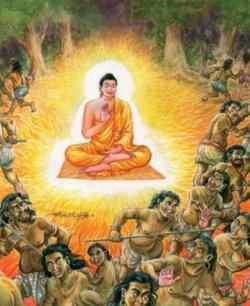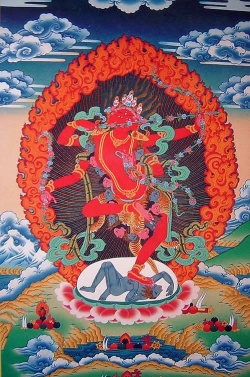Buddhist jurisprudence and laws
Buddhist laws can generally be classified into two categories, natural laws –Rang bzhin gyi khrims as described in the bka‘gyur, Tri Pitaka, Bodhicharyavatara (spyod ‘jug) and bde smon[1], and positive laws – the bcas pa‘i khrims. Differentiation of natural law or positive law is explained in Nagersen and Milenda, which are so relevant and modern. In Buddhism, the positive laws include the six edicts of law, such as:
Khri stse ‘Bum bzher gyi khrims (Law of governance of Army and Executive).[2]
Bum gser thog Sha-ba-can gyi khrims (Law relating to weights, measures and fair trade).[3]
Rgyal-khams dper blangs kyi khrims (Law of the State).[4]
Mdo-lon zhu-bcad kyi khrims (Law of Interrogation).[5]
Dbang chen bcad kyi spyi-khrims]] (Law of the great governors).[6]
Khabso nang-pa‘i khrims (Law relating to fair trial).[7]
Law is further classified into five broad sections,
Nyan-thos kyi khrims (Laws for the dhamma followers),
byangchub Sems-dpa‘i khrims (Laws for the Saints),
bde bar gshegs pa‘i khrims (Laws of Enlightenment),
dge ‘dun gyi khrims (Monastic Laws), and Rang or
Kun gyi khrims (Secular Laws).
Objective of Law
The objective of law is stability, peace and tranquility of all sentient beings. The Buddhist principle of sixteen virtuous acts of social piety (Michos g.tsangma bcu-drug) exhorts that the laws of the past spiritual Monarchs were enacted to secure freedom.[8] Subsequently, Lord Buddha propagated “The Law is that which leads to welfare and salvation… The Law is equal, equal for all beings… Impartial is the law.”[9]
Law must allow each individual to know, before taking any action, what conduct is illegal, why it is forbidden, and what will be the penalty for violation. In substance, the law must forbid only such private conduct that violates the individual rights of others. According to accepted principles of “institia est constans et perpetua voluntas ius suum cuique tribunes” - justice is the constant and perpetual purpose of rendering each man his due and “iuris praecepta sunt hae: honest vivere, alterum not laedere, suum cuique tribuere”- the precept of the law are: to live honestly, not to injure your neighbour, and to render each man his due. Law should be clear and precise, it should leave no room for any person to exercise arbitrary power through unpredictable and subjective decisions. Lord Buddha himself mentioned that:
“He who dispenses justice in an arbitrary manner could never be considered one who abides by the law. One who clearly ascertains both right and wrong is the one who is held as wise and just.”[10]
Furthermore, in Dhammapada it is mentioned that:
“He is not thereby just because he hastily arbitrates cases. The wise man should investigate both right and wrong. The intelligent person who leads others not falsely but lawfully and impartially, who is a guardian of law, is called one who abides by righteousness.”[11]
Law should have utilitarian and functionalist purposes.[12] It must encourage virtue, and prevent vice and immorality. The legal principles must be divided under three divisions, the enunciation of legal values without subordinate sections, elaborate legal remedies, and punishment for violation and non-compliance. Every law must be cautionary to avoid disproportionate punishment and abuse of power.
Law should be practical and enforceable without undermining transparency, accountability, efficiency and professionalism. It should be same to others and to oneself. It should be just and one should be subjected to it.[13] It should be held up by interlocking principles for mutual support, maintain consistency and avoid incoherence. It should be free from passion and ulterior motives. Laws that are biased and legislated in anger will be subjected to the wrath of time.
Laws should be as far as possible just and enduring for its normative, procedural and institutional values including institutional responsibility and accountability. No law lasts forever. This is in consonance with the Buddhist philosophy of impermanence. However, the laws must endure through fluctuating fortunes. Therefore, Mipham Rinpoche cautioned that “If the laws are amended repeatedly, respect and obedience will diminish”.[14]
Judicial Process
Justice is sublime and transcendental. Therefore, Buddhist transcendental wisdom is relevant to law, justice, democracy, freedom and rights. Prajna-Paramita intones transcendental wisdom of the right to freedom of speech, thought and conscience. To protect them, Lord Buddha had established judicial process with due process of law, fair trial and rule of law.
Lord Buddha exhorted that:
“…upholding the Law – Deliberate well and lean not to either side …
Not dispense justice in an arbitrary manner clearly ascertain both right and wrong.
Wise men … Hear both sides first, then judgment true declare;
… a well-weighed verdict[15] gives,
Of righteous judge the fame for ever lives.”
There are two prevalent legal systems in the world. They are the adversarial system (Accusatorial or the Common law system) and the inquisitorial system (Continental or the Civil law system). The principle of adversarial system is well enshrined in the Bardo Thos-grol (Book of the Dead – Garuda Purrana in Sanskrit). The trial performance begins with the production of the accused (a dead person by name of dMyal-bum) before the King of Purgatory, whereby the principle of habeas corpus is upheld. The principle of fair and public trial is demonstrated by the fact that the accused is heard in presence of all the g.shin-rje lasmkhan.[16] The proceeding is presided over by the Lord of Purgatory. The accused is represented by his defence counsel dlha dkarpo and the prosecutor represented by ‘Dre Nagpo invoking the right to legal counsel.
In this particular proceeding, the accused is alleged of the commission of various offences (sins) such as offence against person, property, cultural heritage, wildlife and environment, fraud, defamation etc. The Lord of Purgatory grants the accused the opportunity to plead innocence or guilt. Consequently, the accused here plead guilty invoking the doctrine of necessity and extenuating circumstances. The defence counsel submits that the accused is ignorant. He pleads that although he was made aware of that commission of sins was bad, he was never aware of the consequences of such action after death. He has therefore committed the sins in dullness of mind and not having the knowledge of consequences. He pleads that the punishment may be mitigated under the mitigating circumstances of necessity and compassion. However, the prosecutor (‘Dre Nagpo) in contrast invokes the doctrine of actus reus and mens rea and submits that the accused is guilty of mass destruction of wildlife and the environment. He submits that the accused has used slanderous words, injured and killed many innocent animals, assaulted the poor and innocent, condemned the saints and their religion, burnt down the shrines and temples, polluted the ocean and injured marine life. Moreover, he has tormented his parents and demolished many stupas and monasteries.
The presentation of facts and evidence by the g.shin-rje lasmkhan guarantees the right of the accused not to be condemned unheard or without proof beyond reasonable doubt. The King of Purgatory after having heard the submissions of the parties and based on the facts and issues submitted before him by the parties, render the judgment. Therefore, it has all the elements of fair trial incorporating the principle of natural justice, the right of habeas corpus, right to be represented by a legal counsel, the right to an uninterrupted hearing, the right to be informed of charges, right to defence, production of evidence and witness, and the delivery of a reasoned decision (ratio decidendi).
[Part III]
To be continued
Contributed by
Sonam Tobgye,
Thrimchi Lyonpo
Footnotes
[1] Prayer(pranidh‘ana) to be reborn in the sukhavati paradise of amitabha Buddha by Karma chags med(r‘a ga a syas), 17th century.
[2] The first law Code of King Srongtshen Gambo. The Code enshrines separation of powers and responsibility.
[3] It deals with duties of an individual regarding the matter relating to weights, measures and fair trade etc.
[4] It enshrines duties and obedience to laws.
[5] It enshrines fair trial.
[6] It enshrines adjudication by due process.
[7]It enshrines delivery of equal justice without discrimination.
[8]Freedom encompasses bDe ba to secure happiness, welfare, safety, tranquility, prosperity and liberty.
[9] Dharmasangiti Sutra.
[10]The Dhammapada, The teachings of the Buddha, Verse 19: Endowed with Dharma.
[11] Spoken in the Jetavna Grove, Dhammaññha Vagga, The Just Or Righteous (Text and Translation by Ven. Nàrada), Chapter 19, verse 256.
[12]Normative ethics is rational inquiry into or theory of the standards of right and wrong, good and bad in respect of character and conduct, which ought to be accepted by a class of individuals. Hugo Grotius argued that law arises from both a social impulse. Hayek – “only the existence of common rules makes the peaceful existence of individuals in society possible… the “rationalist” or “constructivist” understanding of the origins of law.”
[13] Mark Tushnet, The insurance theory of constitutional regime – serves as insurance against losing office.
[14] Mipham Rinpoche, rajaniti shastra, page 22.
[15] Doctrine of Ratio-decidendi.
[16]The g.shin-rje lasmkhan includes representatives from the animal kingdom such as Ox, Boar, Tiger, Lion, Raven, Monkey, Bear, Dog, Sheep, Rat, Owl etc.






